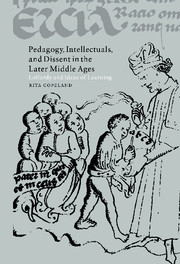Book contents
- Frontmatter
- Contents
- Acknowledgments
- General introduction: pedagogy and intellectuals
- PART 1 From pedagogies to hermeneutics: childhood, the literal sense, and the heretical classroom
- 1 Revaluing the literal sense from antiquity to the Middle Ages
- 2 Lollardy and the politics of the literal sense
- PART 2 Violent representations: intellectuals and prison writing
- Bibliography
- Index
- CAMBRIDGE STUDIES IN MEDIEVAL LITERATURE
2 - Lollardy and the politics of the literal sense
Published online by Cambridge University Press: 22 September 2009
- Frontmatter
- Contents
- Acknowledgments
- General introduction: pedagogy and intellectuals
- PART 1 From pedagogies to hermeneutics: childhood, the literal sense, and the heretical classroom
- 1 Revaluing the literal sense from antiquity to the Middle Ages
- 2 Lollardy and the politics of the literal sense
- PART 2 Violent representations: intellectuals and prison writing
- Bibliography
- Index
- CAMBRIDGE STUDIES IN MEDIEVAL LITERATURE
Summary
In his Art of Preaching, Alan of Lille employs a familiar dictum:
Minoribus autem decet in parabolis loqui, majoribus revelare mysteria regni Dei. Parvuli liquido cibo sunt nutriendi, adulti solido corroborandi; ne parvulus enecetur per solidum, et adultus abominetur liquidum, ut sic singula quaeque locum teneant sortita decenter.
(It is proper to speak to speak to children in parables, and to show to adults the mysteries of the kingdom of God. The very young must be nourished on liquid food, adults invigorated with solid food, lest the child be stunted by solids, and the adult detest liquids. Thus they should each receive the kind of thing befitting their condition.)
However commonplace a pastoral statement this may seem, it contains the very essence of the institutionalized split between pedagogy and hermeneutics. Speaking in “parables,” in this particular context, is simply another version of the digestibility of the letter as story. And the metaphors of milk food and solid food have become as much a part of pedagogical discourse about elementary and advanced reading as of pastoral discourse about spiritual infancy and adulthood. Behind Alan of Lille's dictum lies a long tradition, the outlines of which I have traced in the preceding chapter. I want to turn now to explore the dynamics of pedagogical discourse about the literal sense in the Lollard controversy, to consider where the institutionalized split between pedagogy and hermeneutics has led, and what it has become.
- Type
- Chapter
- Information
- Pedagogy, Intellectuals, and Dissent in the Later Middle AgesLollardy and Ideas of Learning, pp. 99 - 140Publisher: Cambridge University PressPrint publication year: 2001



